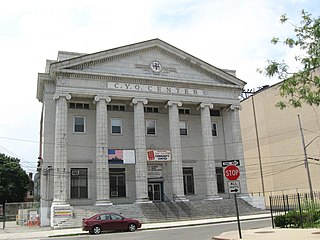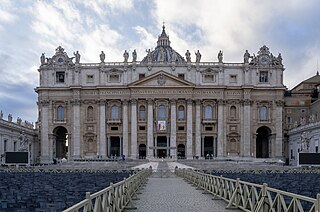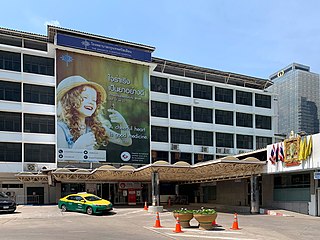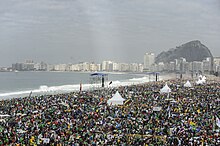
A parish is a territorial entity in many Christian denominations, constituting a division within a diocese. A parish is under the pastoral care and clerical jurisdiction of a priest, often termed a parish priest, who might be assisted by one or more curates, and who operates from a parish church. Historically, a parish often covered the same geographical area as a manor. Its association with the parish church remains paramount.
A vicar is a representative, deputy or substitute; anyone acting "in the person of" or agent for a superior. Linguistically, vicar is cognate with the English prefix "vice", similarly meaning "deputy". It also refers to a senior priest in the Church of England. The title appears in a number of Christian ecclesiastical contexts, but also as an administrative title, or title modifier, in the Roman Empire. In addition, in the Holy Roman Empire, a local representative of the emperor, such as an archduke, could be styled "vicar".

Catholic Youth Organization (CYO) is an international Catholic youth movement founded by Bishop Bernard Sheil in Chicago in 1930. It became a major factor in the development of race relations in the US Catholic Church following World War II.

In Christianity, a minister is a person authorised by a church or other religious organization to perform functions such as teaching of beliefs; leading services such as weddings, baptisms or funerals; or otherwise providing spiritual guidance to the community. The term is taken from Latin minister. In some church traditions the term is usually used for people who have been ordained, but in other traditions it can also be used for non-ordained.
The hierarchy of the Catholic Church consists of its bishops, priests, and deacons. In the ecclesiological sense of the term, "hierarchy" strictly means the "holy ordering" of the church, the Body of Christ, so to respect the diversity of gifts and ministries necessary for genuine unity.
Lay ecclesial ministry is the term adopted by the United States Conference of Catholic Bishops to identify the relatively new category of pastoral ministers in the Catholic Church who serve the Church but are not ordained. Lay ecclesial ministers are coworkers with the bishop alongside priests and deacons. In other contexts, these may be known as "lay pastoral workers", "pastoral assistants", etc.

The Catholic Church in Europe is part of the worldwide Catholic Church in full communion with the Holy See in Rome, including represented Eastern Catholic missions. Demographically, Catholics are the largest religious group in Europe.

The Anglican ministry is both the leadership and agency of Christian service in the Anglican Communion. Ministry commonly refers to the office of ordained clergy: the threefold order of bishops, priests and deacons. More accurately, Anglican ministry includes many laypeople who devote themselves to the ministry of the church, either individually or in lower/assisting offices such as lector, acolyte, sub-deacon, Eucharistic minister, cantor, musicians, parish secretary or assistant, warden, vestry member, etc. Ultimately, all baptized members of the church are considered to partake in the ministry of the Body of Christ.
Youth ministry, also commonly referred to as youth group, is an age-specific religious ministry of faith groups or other religious organizations, usually from ages 12 to 30, whose mission is to involve and engage with young people who attend their places of worship, or who live in their community. Christian youth ministry usually encompasses one or more of the following:
An ecclesial base community is a relatively autonomous Christian religious group that operates according to a particular model of community, worship, and Bible study. The 1968 Medellín, Colombia, meeting of Latin American Council of Bishops played a major role in popularizing them under the name basic ecclesial communities. These are small groups, originating in the Catholic Church in Latin America, who meet to reflect upon scripture and apply its lessons to their situation.

Christianity was first introduced to Thailand by European missionaries. By 2021, it represented 1.2% of the predominantly Buddhist national population. Christians are numerically and organizationally concentrated in northern Thailand, where they make up an estimated 16% of the population in some lowland districts and up to very high percentages in tribal districts.
The FIMCAP, which is short for Fédération Internationale des Mouvements Catholiques d'Action Paroissiale, is an umbrella organization for Catholic youth organizations. Its 31 member organizations are based in 28 countries. The FIMCAP was founded in 1962 and is recognised as an official Catholic organization by the Dicastery for Laity, Family and Life. FIMCAP is also a full member of the European Youth Forum.
A rector is, in an ecclesiastical sense, a cleric who functions as an administrative leader in some Christian denominations. In contrast, a vicar is also a cleric but functions as an assistant and representative of an administrative leader.
The Lithuanian Catholic Federation Ateitis is a youth organization in Lithuania uniting Catholic-minded schoolchildren, university students, and alumni. Ateitis is a member of the Fimcap umbrella group of Catholic youth organizations. Members of the Ateitis Federation are known as ateitininkai.
eRko – Hnutie kresťanských spoločenstiev detí (eRko) is a Catholic youth organization in Slovakia. eRko is a member of the Catholic umbrella of youth organizations "Fimcap". eRko is registered at the Ministry of Interior of the Slovak Republic as a non-governmental organisation. eRko is also a member of CIDSE. eRko is based in Roman Catholic parishes as well as in Greek Catholic parishes. eRko is one of the biggest children's organizations in Slovakia.
Katholische Jungschar is the official organization for children of the Catholic church in Austria and South Tyrol and one of the lay movements of the Catholic action. Katholische Jungschar is the biggest children organization in Austria. More 100,000 children take regularly part in its activities. The local groups are run by about 15,000 group leaders. Katholische Jungschar is a member of the umbrella of Catholic youth organizations Fimcap.
Asociația Grupurilor Locale de Tineret is a Romanian youth organisation. At international level AGLT is an associate member of the Catholic umbrella of youth organizations Fimcap.
The Catholic Youth Organization Nigeria is a Catholic youth organization in Nigeria. CYO Nigeria is a member of the Catholic umbrella of youth organizations Fimcap.
The Kiro Congo (KCD) is a Catholic youth organization in the Democratic Republic of Congo. It is one of the more important youth movements in the country. Kiro Congo is a member of the Catholic umbrella of youth organizations Fimcap.
Kiwo Ayiti or Mouvement Kiro d'Haïti a Catholic youth organization in the Haiti. Kiwo Ayiti is a member of the Catholic umbrella of youth organizations Fimcap.











